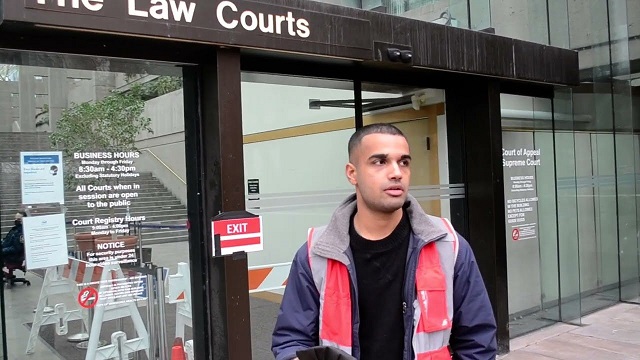Alberta
Millions of jobs to be ‘disrupted’ by Canada’s Just Transition as world oil demand reaches new highs

Petroleum consumption is expected to hit a record 102 million barrels per day in 2024
From the Canadian Energy Centre Ltd.
A newly public federal document reveals that more than 2.7 million jobs across Canada can expect a “significant disruption” as a result of Ottawa’s Just Transition plan to reduce emissions.Ironically, it comes at the same time as new analysis showing that world oil demand continues to rise.
Global petroleum consumption is expected to hit a record 102 million barrels per day in 2024, up from 97 million barrels per day in 2021, according to the latest outlook from the U.S. Energy Information Administration.
“Oil consumption/demand growth may be modest in the 1.4 billion [population] OECD countries, but can’t hold back the 6.4 billion [population] non-OECD countries from growing economies and petroleum products consumption at stronger rates,” said Dan Tsubouchi, chief market strategist with Canadian investment management firm SAF Group.
According to the International Energy Agency, oil and gas will still meet 47 per cent of global energy demand in 2050 as more renewable energy comes online, down only slightly from 52 per cent in 2021.
Canada’s Just Transition plan won’t change world energy demand or world emissions. But it will impact Canadian jobs, and not just in oil and gas.
According to the federal memo, the most jobs at stake are in building trades (1.4 million), followed by transportation (642,000), agriculture (292,000), energy (202,000), and manufacturing (193,000).
The idea is that people will need help finding new jobs in the “green economy” as oil and gas use declines. But the issue facing Canada’s building trades today is not a lack of work for their members. It’s finding enough workers to do jobs like maintenance at oil and gas projects, building new potash mines, liquefied natural gas terminals, or hydrogen facilities, says Terry Parker, executive director of Building Trades of Alberta.
“When the oil and gas sector is affected by the Just Transition, it will actually affect not just people here in Alberta, but right across Canada,” he says.
Developing and maintaining wind and solar energy projects requires fewer people and offers lower incomes than oil and gas, he says.
“I’m not saying I don’t want that work, but the thing is the skill level does not necessarily require a certified tradesperson,” Parker says.
“In solar and wind, the pay rate is a lot less compared to what the individual was getting paid in the oil and gas sector. So, you’re saying we only need a portion of the people to do those projects, then we’re going to pay them half the rate. They had great jobs where they’re making six figures and now we’re going to take them down to $60,000 [or] $80,000 a year. It’s ridiculous.”
Canada’s oil and gas industry is primarily based on exports – $86 billion worth in 2020, or 16 per cent of Canada’s total export business, according to the federal government. Today trade is mostly with the U.S., but with projects like the Trans Mountain expansion and LNG Canada the sector will be able to reach more of the global market.
The Just Transition threatens Canada’s ability to build new energy projects.
“I think that they’re moving the cart before the horse to some extent,” Parker says.
Alberta
Former senior financial advisor charged with embezzling millions from Red Deer area residents

News release from Alberta RCMP
Former senior financial advisor charged for misappropriating nearly $5 million from clients
On April 4, 2024, the RCMP’s Provincial Financial Crime Team charged a Calgary resident for fraud-related offences after embezzling millions of dollars from his clients while serving as a senior financial advisor.
Following a thorough investigation, the accused is alleged to have fraudulently withdrawn funds from client accounts and deposited them into bank accounts he personally controlled. A total of sixteen victims were identified in the Red Deer area and suffered a combined loss of nearly $5 million.
Marc St. Pierre, 52, a resident of Calgary, was arrested and charged with:
- Fraud over $5,000 contrary to section 380(1)(a) of the Criminal Code; and,
- Theft over $5,000 contrary to section 344(a) of the Criminal Code.
St. Pierre is scheduled to appear in Red Deer Provincial Court on May 14, 2024.
“The ability for financial advisors to leverage their position to conduct frauds and investment scams represents a significant risk to the integrity of Alberta’s financial institutions. The investigation serves as an important reminder for all banking clients to regularly check their accounts for any suspicious activity and to report it to their bank’s fraud prevention team.”
- Sgt. John Lamming, Provincial Financial Crime Team
The Provincial Financial Crime Team is a specialized unit that conducts investigations relating to multi-jurisdictional serious fraud, investments scams and corruption.
Alberta
Political parties will be part of municipal elections in Edmonton and Calgary pilot projects

Strengthening Alberta’s local elections
Alberta’s government is introducing legislation to ensure Albertans can rely on transparent, free and fair elections, and municipally-elected officials have clearer accountability measures.
In a democratic society, Albertans expect their local elections to be free and fair, and their elected officials to be held to account by clear rules that govern their local councils. The Municipal Affairs Statutes Amendment Act proposes amendments to the Local Authorities Election Act (LAEA) and the Municipal Government Act (MGA) to add greater transparency to local election processes and ensure local councils and elected officials continue to remain accountable to the citizens who elected them.
“Our government is committed to strengthening Albertans’ trust in their local governments and the democratic process that elects local leaders. The changes we are making increase transparency for Alberta voters and provide surety their votes will be counted accurately. We know how important local democracy is to Albertans, and we will work with local authorities to protect and enhance the integrity of local elections.”
Local Authorities Election Act
Albertans expect free and fair elections and that’s why it’s important we strengthen the rules that govern local elections. To strengthen public trust in local elections, Alberta’s government will eliminate the use of electronic tabulators and other automated voting machines. All Albertans should be able to trust the methods and results of local elections; requiring all ballots to be counted by hand, clarifying rules and streamlining processes for scrutineers will provide voters greater assurance in the integrity of the results.
All eligible Albertans should be able to vote in local elections without impediment. Alberta’s government will limit the barriers for eligible voters to cast a ballot by expanding the use of special ballots. Currently, special ballots can only be requested for very specific reasons, including physical disability, absence from the municipality, or for municipal election workers. By expanding the use of special ballots, the government is encouraging more voter participation.
Amendments in the Municipal Affairs Statutes Amendment Act would increase transparency in local elections by enabling political parties at the local level. Political parties would be enabled in a pilot project for Edmonton and Calgary. The act will not require candidates to join a political party in order to run for a local or municipal office, but will create the opportunity to do so.
In addition, proposed changes to the Local Authorities Election Act would allow municipalities the option to require criminal record checks for local candidates, thus increasing transparency and trust in candidates who may go on to become elected officials.
Municipal Government Act
The role of an elected official is one with tremendous responsibility and expectations. Changes proposed to the Municipal Government Act (MGA) will strengthen the accountability of locally elected officials and councils. These include requiring mandatory orientation training for councillors, allowing elected officials to recuse themselves for real or perceived conflicts of interest without third-party review and requiring a councillor’s seat to become vacant upon disqualification.
If passed, the Municipal Affairs Statutes Amendment Act will also unlock new tools to build affordable and attainable housing across Alberta. Proposed amendments under the MGA would also create more options for municipalities to accelerate housing developments in their communities. Options include:
- Exempting non-profit, subsidized affordable housing from both municipal and education property taxes;
- Requiring municipalities to offer digital participation for public hearings about planning and development, and restricting municipalities from holding extra public hearings that are not already required by legislation; and
- Enabling municipalities to offer multi-year residential property tax exemptions.
Municipal Affairs will engage municipalities and other partners over the coming months to hear perspectives and gather feedback to help develop regulations.
Quick facts
- The LAEA establishes the framework for the conduct of elections in Alberta municipalities, school divisions, irrigation districts and Metis Settlements.
- The MGA establishes the rules governing the conduct of local elected officials once on council, as well as the overall administration and operation of municipal authorities in Alberta, including any policy those authorities may wish to implement.
Related information
-

 COVID-198 hours ago
COVID-198 hours agoPfizer reportedly withheld presence of cancer-linked DNA in COVID jabs from FDA, Health Canada
-

 Censorship Industrial Complex21 hours ago
Censorship Industrial Complex21 hours agoJordan Peterson, Canadian lawyer warn of ‘totalitarian’ impact of Trudeau’s ‘Online Harms’ bill
-

 Alberta1 day ago
Alberta1 day agoAlberta rejects unconstitutional cap on plastic production
-

 Alberta1 day ago
Alberta1 day agoAlberta official reveals ‘almost all’ wildfires in province this year have been started by humans
-

 Bruce Dowbiggin1 day ago
Bruce Dowbiggin1 day agoCome For The Graduate Studies, Stay For The Revolution
-

 Business1 day ago
Business1 day agoTaxpayers criticize Trudeau and Ford for Honda deal
-

 Business2 days ago
Business2 days agoDon’t be fooled by high-speed rail
-

 Alberta1 day ago
Alberta1 day agoPolitical parties will be part of municipal elections in Edmonton and Calgary pilot projects








